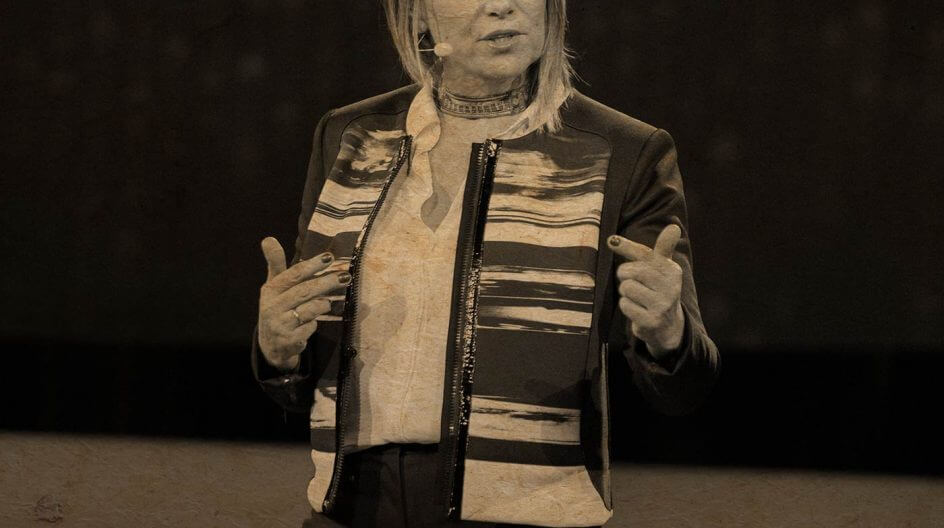Our From the Vault series examines episodes from The Art of Charm’s past more deeply; we invite you to revisit them — or discover them for the first time — with us. This From the Vault looks at a conversation on relationships between two people who take them very seriously.
Episode 410: Mating In Captivity was originally broadcast in May 2015 and featured well-known relationship expert Esther Perel. Esther is in demand as an internationally known speaker. She speaks nine languages (seven in which she works, two in which she socializes), has not one but two TED talks that have been viewed by millions, and is the author of a book, Mating in Captivity: Unlocking Erotic Intelligence, that has been translated, at last count, into twenty-five languages. She sat down with Jordan to discuss why relationships are more complex than ever, why we’re failing, and what we can do to improve.
Why Are Relationships Hard Today?
Jordan began the discussion by asking why, despite so many years of evolution, we still have challenges with relationships. Esther pointed out there are things much simpler than relationships that we do poorly when we are given many choices. Consider sleeping and eating. Despite our advances in technology and research, and despite what we know, we still make poor choices like sleeping too little or eating junk food. We shouldn’t be surprised that today, when we have so many choices in relationships, we make proportionally poor decisions.
They’ve Become Consumerized…
The focus on consuming and consumer behavior has infiltrated so many parts of our lives that we shouldn’t be surprised that these tendencies have crept into the way we view relationships. Concepts like novelty, return on investment, “not settling,” “cutting your losses,” and replacement are so ingrained in our thinking that there is but a short distance to travel before one starts applying those ideas to relationships. We get comfortable with discarding and leaving when these are not strategies that deal with issues, but simply ways to shut the issues away.
First Steps
When Esther does relationship counseling, she begins by asking a series of questions related to how someone treats his or her clients at work.
- Do you respond to communications like texts and emails in a timely fashion?
- Do you show your charming self whenever possible?
- Are you grateful and do you express it more than occasionally?
- Do you apologize when you’ve messed up and take accountability for your actions?
She finds that the answers are “generally, yes” to these questions, but when she pivots the question to their relationship, the answers become “generally, no.”
“If the people acted in their personal lives the way they do in their professional lives, I would have fifty percent less work overnight,” she opined.
In a vendor/client relationship, the incentives and consequences of following these protocols are a lot more clear than they are in a personal relationship.
Esther noted that her quote, “The quality of your life depends on the quality of your relationships,” came from working with Tony Robbins; to make progress, we have to go beyond playing a role. Are we doing something because we are being watched as we play a role, or are we doing the right thing because we are compelled — because it is part of our identity?
Character is what we do when no one is looking — this also has to be the standard in our personal relationships if we wish them to succeed.
Make Adjustments
Jordan made the point that sometimes when we are with our significant other and are particularly flirty and playful, he/she might respond, “What’s gotten into you?” It should be an opportunity to realize that you’ve been failing to do something — because your behavior is noted as abnormal. Make a note of it and resolve to do better.
Esther also notes that she encourages her sons not to sit and listen in silence when people are being spoken of badly in their presence. Disrupt it — be an upstander, not a bystander. Because language shapes the narrative, you can step in the gap and break a bad pattern for them.
Jordan agreed and noted that the type of people who say hurtful things about others — sometimes even their significant others — are simply looking for approval and they may not actually truly believe what they’re saying. Your silence may betoken your consent, so yes, disrupt them with something as simple as, “Do you really believe that?”
Advancing
Once you’ve taken those early steps and started to make adjustments, you can start to make bigger leaps, and this is done the same way you do anything else in life: study and research! “You wouldn’t buy a house or a car without doing some research, yet people haven’t read or studied anything about improving relationships in decades!” Esther noted.
There’s also the chance to say “Thank you” for the things that no one ever thinks of. Esther gave a poignant example of a spouse on a business trip who calls from a hotel room and gives gratitude, “Thank you for giving me the freedom to do this — to work, to not have to worry, to sit quietly in a hotel room and call someone I love. I know it’s been some time since you’ve been able to do something like that without little people demanding your time or crawling on you and I just want to tell you that I love you and appreciate you.”
Remember that From the Vault is just a short overview of any given podcast episode. If you’d like to hear more from Esther and Jordan, including why the person apologizing has all the power, why you’ll be respected for the job you do by your family but you’ll never be loved for it, and what so many fights are really about, you can listen to the entire episode and read the full show notes here.
What’s one way that you think you could improve in your relationships? Send it to [email protected] for some tools we can send you.
If this article or episode helped you, please consider writing a review for us on iTunes, because the greatest compliment you can give us is a referral to someone you think would appreciate this content. Now get out there and leave everyone better than you found them.

